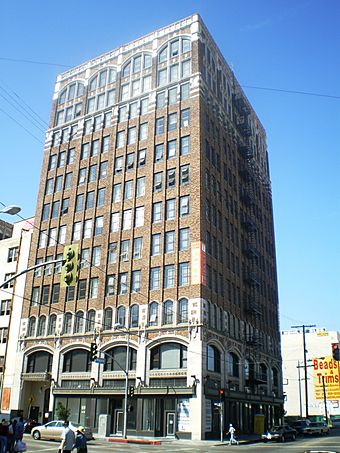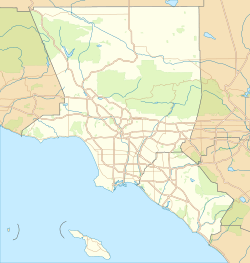Textile Center Building facts for kids
Quick facts for kids |
|
|
Textile Center Building
|
|

Textile Center Building, 2008
|
|
| Location | 315 E. Eighth St., Los Angeles, California |
|---|---|
| Built | 1926 |
| Architect | William Douglas Lee |
| Architectural style | Late Gothic Revival, Italian Renaissance Revival |
| NRHP reference No. | 05000048 |
| Added to NRHP | February 15, 2005 |
The Textile Center Building is a tall, 12-story building in the Los Angeles Fashion District. It was built using a mix of Gothic Revival and Italian Renaissance Revival styles. This brick building was designed by William Douglas Lee. It first opened in 1926 as a busy place for making clothes. Today, it has been changed into modern homes called condominiums.
Contents
A Look at the Textile Center Building
This historic building stands out in downtown Los Angeles. It was designed to look like old European buildings. The Gothic Revival style uses pointed arches and tall windows. The Italian Renaissance Revival style brings in ideas from old Italian buildings, like grand entrances.
How the Building Was Built
A smart woman named Florence C. Casler was in charge of building the Textile Center. She was a pioneer, meaning she was one of the first women to develop and build large properties. She even kept her own office in the building after it was finished.
When the building opened in April 1926, it was a big event. More than 6,000 people came to see it! The Los Angeles Times newspaper reported on the grand opening. There was even a fashion show. It showed off clothes that were made right there in Los Angeles.
The Textile Center Building was made to be a hub for clothing makers. It had lots of space for different businesses. In 1927, it was noted that the building had about 88,704 square feet of space. It cost over $626,000 to build. All the spaces were rented out to 56 different businesses. This showed how popular and successful the building was. In 1945, the building was sold for $450,000.
From Factories to Homes
In 2005, the Textile Center Building got a new purpose. It was changed into "loft-style condominiums." These are apartments with open spaces and high ceilings. Work started in January 2005 to create 64 new homes. The building also got 5,000 square feet of space for shops.
This project was part of a bigger plan by MJW Investments. They changed nine old clothing factory buildings into places where people could live and work. By 2006, the building was filling up with people. They were looking for a city lifestyle in these cool, modern loft homes.
Why the Building is Special
The Textile Center Building is important because of its history and design. It has been officially recognized as a historic building. In April 2002, the city of Los Angeles named it a Historic Cultural Monument. This means it's a special place that the city wants to protect.
Then, in 2005, it was added to the National Register of Historic Places. This is a list of important places across the entire United States. Being on this list helps make sure the building's history and unique style are preserved for many years.
 | Emma Amos |
 | Edward Mitchell Bannister |
 | Larry D. Alexander |
 | Ernie Barnes |




